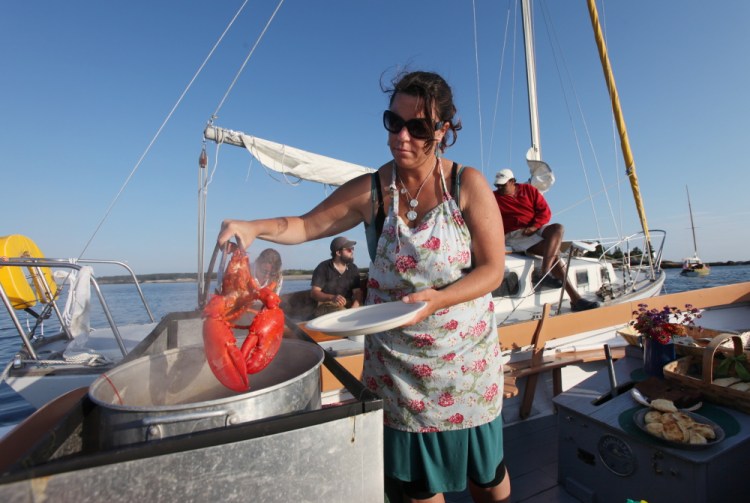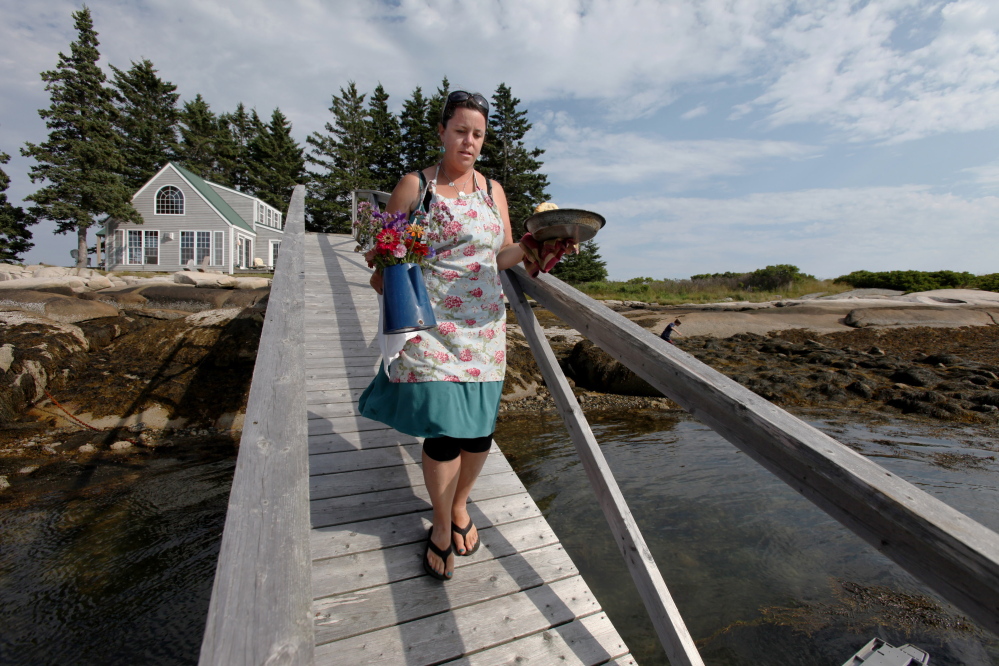An entrepreneur whose floating restaurant serves only sailors and motorists in a remote Penobscot Bay anchorage was told by the state to cease service immediately after being featured in a story Wednesday in the Portland Press Herald.
“It makes me feel sick to my stomach and sad,” said Reilly Harvey, who runs Mainstay Provisions out of an old boat she keeps on Andrews Island. Harvey said she was contacted by a state health inspector and told she must pass health inspection standards for mobile vendors – think food trucks – and get her vintage 22-foot wooden launch, the Mainstay, fitted with sinks and hot and cold running water if she is going to continue to serve hot food.
That licensing would happen through the Division of Environmental Health’s inspection program. If she wants to continue to serve desserts, she must pass an additional inspection by the Department of Agriculture, Conservation and Forestry.
There are only 3½ weeks left in her season. Unless she is able to comply with the regulations, it is unlikely she’ll be able to operate Mainstay Provisions as usual in 2014.
Harvey started the seasonal business, operating from Memorial Day to Labor Day, to be able to spend summers on Andrews Island, where she grew up with her brother, mother and father, a lobsterman who died in 2011. She lives in Owl’s Head for most of the year and does her baking there, but she considers Andrews her true home.
“It is my heritage and my heart,” she said.
Harvey hopes to comply with the regulations. She must add a three-bay sink and a separate hand sink, and must have running hot and cold water (not from the sea) to comply with the same regulations that apply to food trucks on land.
Lisa Roy, manager of Maine’s Health Inspection Program, which shut Harvey down, said Harvey’s situation is unique in Maine and that the department would work to expedite her application as soon it was received. “Our inspector will go right out there,” Roy said Thursday. “It could be as soon as tomorrow.”
Roy said she understands the challenges Harvey faces as a small-business operator working from a boat and being considered a mobile vendor.
“It’s more difficult for her to have the equipment that typically we would require a mobile unit to have,” she said. In relation to the requirement that Harvey have hot and cold running water, Roy said, the department may consider alternatives to mitigate possible health risks.
Harvey sells boiled lobsters, clams and the fixings of a full bake, including corn, drawn butter, salads, biscuits and baked desserts. The main courses are cooked to order on a three-burner stove and handed over on paper plates, or sometimes placed on plates provided by the cruisers. The desserts are pre-baked in Owl’s Head.
During the dinner shift the Press Herald spent with her in late July, Harvey sold a handful of lobsters, three orders of clams and fewer than 10 desserts to people on about a half-dozen boats, all of whom could look directly into her “kitchen” on the deck of her open boat.
“It certainly would never cross my mind that there are food safety issues,” said publisher Curtis Rindlaub, who encountered Harvey while working on his updated version of “A Cruising Guide to the Maine Coast.” “Cruising is somewhat like glorified camping, so therefore anything cooked for you is an extra special treat.” He described Harvey as “an icon of the harbor and a draw in her own right.”
In the phone call telling her to cease and desist, Harvey said a state inspector also objected to her being barefoot – on boats since she was a child, Harvey feels safer and more stable barefoot – and brought up the issues of hygiene related to changing diapers. Harvey has a newborn.
“I wasn’t present for that conversation,” Roy said. “I think in that context, typically what our inspectors do is try to educate people on hygiene.”
John Bott, spokesman for the Department of Agriculture, said in an email that Harvey can apply online for her license with that department.
“If Ms. Harvey submits an application for a home food license, we will expedite it and travel to Owl’s Head,” he wrote. “We want her to be successful and will do what we can to support her small business.”
Harvey is licensed to sell shellfish, and says she tried unsuccessfully to get Mainstay Provisions fully licensed with the state two years ago when she started her business. She said she found that neither department seemed to know how to regulate the specialized business she was running. Bott had no record of her applying.
While Harvey figures out how to retrofit Mainstay, she is entitled to go boat to boat – the anchorage between High and Dix islands might hold 30 yachts on a weekend night – offering raw clams and lobsters that boaters can cook themselves.
But handing over raw seafood defeats the purpose of her business, which is “so their galley doesn’t stink and they don’t have to watch the lobster pot and just the fact that it is beautiful and I am doing the work for them,” Harvey said.
Karl Sutton, who runs a food truck/trailer called Bite into Maine in Cape Elizabeth, said Mainstay’s operation sounded like “apples to oranges” in comparison to the classic mobile vendor, like his lobster roll business, which does have a three-bay sink. He wondered whether there might be “special considerations” that could apply to Harvey, as there are for other more informally structured food service events.
Rindlaub, who described himself as “pretty fond of those monster-sized brownies” that Harvey makes, said he doesn’t understand how the brownies by boat are different from, say, a freshly baked pie being sold at a farmstand. “That’s also from their kitchen to your mouth via your wallet,” Rindlaub said.
“What a shame,” he said. “I feel for her.”
Copy the Story LinkSend questions/comments to the editors.





Success. Please wait for the page to reload. If the page does not reload within 5 seconds, please refresh the page.
Enter your email and password to access comments.
Hi, to comment on stories you must . This profile is in addition to your subscription and website login.
Already have a commenting profile? .
Invalid username/password.
Please check your email to confirm and complete your registration.
Only subscribers are eligible to post comments. Please subscribe or login first for digital access. Here’s why.
Use the form below to reset your password. When you've submitted your account email, we will send an email with a reset code.